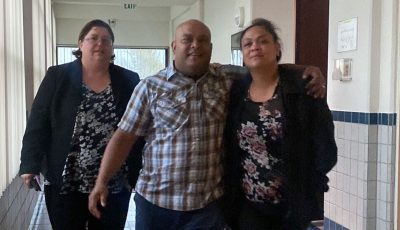CW family of 4 fears April renewal season
A family of four who relies solely on the father who has a CNMI-Only Transitional Worker permit fears for the outcome when his CW permit goes up for renewal this April.
James, a CW-1 holder who has been on island for over 24 years, is husband to Anne, who has also been on Saipan for over 24 years but is now a CW-2 permit holder. Their children, 15-year-old Jess and 12-year-old Carl, were both born here and are U.S. citizens.
Despite a proposed bill to extend the CW program until 2029, James told Saipan Tribune that he remains anxious about the program’s undecided fate.
“If the CW extension does not [happen], it would be difficult for us as a family because we have kids,” he said, adding that he and Anne have yet to plan any contingencies in the event the CW program extension does not push through.
U.S. Citizen and Immigration Services last November announced the caps for fiscal years 2017, 2018, 2019, and 2020 (at 12,998, 9,998, 4,999, and 2,999 respectively). Without legislative intervention, the CW program is slated to expire on Dec. 31, 2019.
“We haven’t thought of anything for now because, by faith, we need the CW program extension,” James said, adding that his and his wife’s finances are also a factor.
James started out on Saipan as a farmer for three years before being employed as an air-conditioning technician. He has been one since then.
According to Anne, Carl has a hearing impairment, making it extremely difficult to relocate to the Philippines since special education there is steep.
“Special education [in the Philippines] is nothing like that here on Saipan, where students with disabilities are prioritized in the public education system,” she said.
Anne is currently a CW-2 permit holder. If James’ CW-1 permit were denied, Anne would have to leave the CNMI as well.
Both Anne and James noted that they have been on island since before the CW program and have benefited from other employment permits such as the umbrella permit and the labor and immigration entry permit of the early 2000s.
Their daughter Jess’ concerns revolve around her future academics and how to finance them. According to the 15-year-old, she does not feel comfortable moving to a new environment with a different culture and language, which means she may be forced to stay behind if her parents are forced to leave.
“I would be devastated. It would affect my studies since my parents aren’t here, especially since…it will [affect my schooling and living expenses],” said Jess. “My parents provide for mostly everything, so if I am left to stay here and they both leave, who would they leave me with?” she said, adding that it would also be a burden to those looking after her.
All three remain hopeful for the passage of the CW program extension. U.S. Sen. Lisa Murkowski (R-AK) introduced last January her S. 2125 in the U.S. Senate, while Delegate Gregorio Kilili C. Sablan (Ind-MP) introduced H.R. 4869, an exact copy, in the U.S. House.
The U.S. Senate legislative hearing for S. 2325 was held on Feb. 6, 2018, with Sablan, Gov. Ralph DLG Torres, Rep. Angel A. Demapan (R-Saipan), Senate President Arnold I. Palacios (R-Saipan), CNMI Labor Secretary Vicky Benavente, and members of the Northern Marianas Business Alliance Corp. attending the hearing.
The U.S. House legislative hearing for H.R. 4869 would be held this Feb. 28, 2018, according to Sablan.



























